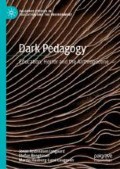Abstract
This chapter argues for the potentiality of the Lovecraftian Denial-Insanity-Death spectrum and insists that a special pedagogical potential is found in the twilight zone between denial and insanity when targeting issues such as environmental, sustainability and climate change issues. Pedagogy (and pedagogy in learning and education) should aim higher than the classic linear notion of acquiring knowledge, skills and competences and ensuring emancipation through enlightenment. A dark pedagogy should address the issues and concepts that escape efforts to fully understand them and drag them into an illuminated position. The point is to emphasize that pedagogical approaches dealing with wicked problems such as climate change, environmental and sustainability issues needs to move in the twilight zone between denial-insanity-death, or push for a collapse of these distinctions in order to develop our understandings and our possibilities for dealing with the challenges that seemingly moves closer day to day. By levering different positions within speculative realism on the potentiality of a denial-insanity overlap this chapter pushes for non-cynical pedagogy that both accepts the fallibilities of human beings and the need to address what is not only human, and often way beyond our comfort zone.
Access this chapter
Tax calculation will be finalised at checkout
Purchases are for personal use only
References
Agyeman, J. (2003). “Under-Participation” and Ethnocentrism in Environmental Education Research: Developing “Culturally Sensitive Research Approaches”. Canadian Journal of Environmental Education, 8(1), 80–94.
Anders Wijkman, J. R. (2012). Bankrupting Nature: Denying Our Planetary Boundaries. London and New York: Routledge.
Biesta, G. (2002). Bildung and Modernity: The Future of Bildung in a World of Difference. Studies in Philosophy and Education, 21(4–5), 343–351.
Biesta, G. (2014). Beautiful Risk of Education. Boulder, CO: Paradigm Publishers.
Biesta, G., & Miedema, S. (2002). Instruction or Pedagogy? The Need for a Transformative Conception of Education. Teaching and Teacher Education, 18(2), 173–181.
Bogost, I. (2012). Alien Phenomenology, or, What It’s Like to Be a Thing. Minneapolis: University of Minnesota Press.
Boogaard, B. K., Oosting, S. J., & Bock, B. B. (2008). Defining Sustainability as a Socio-Cultural Concept: Citizen Panels Visiting Dairy Farms in the Netherlands. Livestock Science, 117(1), 24–33.
Bowers, C. A., & Apffel-Marglin, F. (2004). Re-thinking Freire: Globalization and the Environmental Crisis. London: Routledge.
Brassier, R. (2007). Nihil Unbound: Enlightenment and Extinction. London: Palgrave Macmillan.
Brassier, R. (2011). I Am a Nihilist Because I Still Believe in Truth. Kronos, Kronos.
Bryant, L. R. (2011). The Democracy of Objects. Michigan: Open Humanities Press.
Griffin, A. (2017). 15,000 Scientists Give Catastrophic Warning About the Fate of the World in New ‘Letter to Humanity’. Independent.
Harman, G. (2009). Towards Speculative Realism. Winchester and Washington, DC: Zero Books.
Harman, G. (2011). The Quadruple Object. Alresford: Zero Books.
Harman, G. (2012). Weird Realism: Lovecraft and Philosophy. Winchester and Washington, DC: Zero Books.
Klafki, W. (2010). Studien zur Bildungstheorie und Didaktik. Weinheim: Beltz.
Mannion, G., Fenwick, A., & Lynch, J. (2013). Place-Responsive Pedagogy: Learning from Teachers’ Experiences of Excursions in Nature. Environmental Education Research, 19(6), 792–809.
Meillassoux, Q. (2009). After Finitude. London: Continuum.
Miner, H. (1956). Body Ritual Among the Nacirema. American Anthropologist, 58(3), 503–507.
Morton, T. (2010). The Ecological Thought. London: Harvard University Press.
Morton, T. (2013). Hyperobjects. Minneapolis: University of Minnesota Press.
Morton, T. (2016). Dark Ecology. New York: Columbia University Press.
Saari, A., & Mullen, J. (2018). “Dark Places: Environmental Education Research in a World of Hyperobjects.” Environmental Education Research, 1–13. https://doi.org/10.1080/13504622.2018.1522618.
Shryock, A., Smail, D. L., Earle, A., & Shryock, A. (2011). Deep History: The Architecture of Past and Present. Berkeley: University of California Press.
Sterling, S. (2017). Assuming the Future: Repurposing Education in a Volatile Age. In B. Jickling & S. Sterling (Eds.), Post-sustainability and Environmental Education. Cham: Palgrave.
Storksdieck, M. (2006). Field Trips in Environmental Education. Berlin: BWV Verlag.
Thacker, E. (2011). In the Dust of This Panet. Winchester and Washington, DC: Zero Books.
Author information
Authors and Affiliations
Corresponding author
Rights and permissions
Copyright information
© 2019 The Author(s)
About this chapter
Cite this chapter
Lysgaard, J.A. (2019). Dark Pedagogy Between Denial and Insanity. In: Dark Pedagogy. Palgrave Studies in Education and the Environment. Palgrave Pivot, Cham. https://doi.org/10.1007/978-3-030-19933-3_5
Download citation
DOI: https://doi.org/10.1007/978-3-030-19933-3_5
Published:
Publisher Name: Palgrave Pivot, Cham
Print ISBN: 978-3-030-19932-6
Online ISBN: 978-3-030-19933-3
eBook Packages: EducationEducation (R0)

